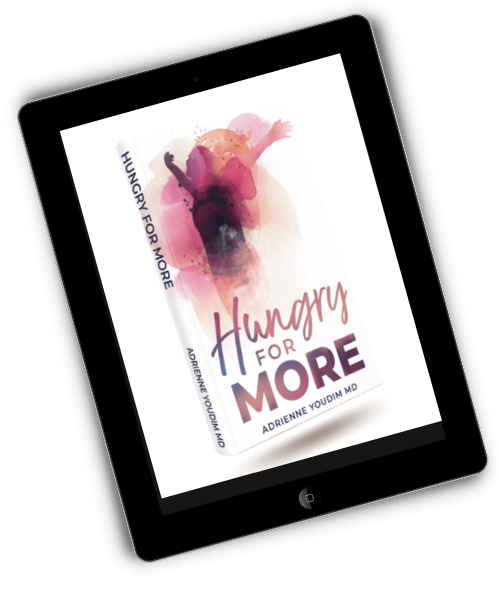Why do I eat when I’m not hungry?
There are many reasons we eat, hunger being just one of them. This is the first post in a series about Hunger, the different ways that we perceive hunger, and some of the emotional and spiritual hunger that drive us to food. Whether we label ourselves as emotional eaters or not, our emotions do dictate our hunger and the science shows us that. We experience hunger when we are sad and when we are happy, when we are bored and when we are anxious. Emotions often trigger our hunger and as will discuss- this is physiologic too. But more of that later. For now, let’s just focus on hunger itself.
Hunger or energy homeostasis is determined by an intricate system of hormones or chemicals released by our digestive system, our pancreas, and our fat cells to inform our brain of hunger and satiety or fullness. These hormones are released in part in response to the food we eat as well as how much fat is stored in our bodies.
Hunger hormones are also affected by fasting and restricting. They are affected by the types of food we eat, such as protein and carbs. They’re also affected by weight loss in ways that might be surprising.
These hormones then will signal a part of the brain called the hypothalamus. The hypothalamus is a deep structure in the brain. You probably have heard of it because the hypothalamus is also responsible for our circadian rhythm or our sleep cycle. It is also responsible for regulating our body temperature, thirst as well as other aspects of homeostasis or balance in the body. The hypothalamus also has centers that regulate our appetite and hunger.
OK, So, let’s dive into the science a bit.
The Science Behind Hunger
This is nerdy but interesting and I promise to keep it light! So, as I mentioned, there are chemicals or hormones that are released by the gut – the stomach and intestines that signal hunger to the brain. For example, ghrelin is a hormone that comes from the stomach. Ghrelin levels steadily rise before meals, signaling to the hypothalamus of the brain that we are hungry and when we eat, ghrelin is suppressed or drops down. Then again it steadily rises, again we eat, and again levels drop. So, there is a very predictable rise and fall of ghrelin around mealtimes that tell our brains we are hungry.
There is another hormone called, GLP-1, on the other hand, that is released from the small intestine within minutes of eating and again when food travels down to the small intestine. When the intestines “sense” nutrients, this hormone rises and signals fullness to the brain. These are just 2 examples of gut hormones but there are many others.
So, to recap we have hormones that respond almost immediately to food ingestion that signal fullness to the brain. But, …
There are also longer-term energy signals. For example, leptin, comes from adipocytes, which is just a fancy name for a fat cell. Unlike the other hormones we talked about, leptin is a long-term signal that is released in relation to the amount of fat stored in the cell so the more fat accumulation in a cell, the greater the release of leptin. This makes sense because the extra storage of calories as fat is being relayed to the brain as a signal to eat less.
And again there are others, but the point is that there is a complex system of hormones that dictate our hunger. But here’s the thing, When we do not eat, as in fasting, satiety cues get dysregulated. For example, leptin and GLP-1 decrease with fasting, creating more hunger. Remember these hormones signal that we are full, so if we release less, we will be more hungry, make sense?
Have you even gone way past your hunger? Like you were running around all day and didn’t eat until you were like starving? Do you remember? How easy was it to get full? Usually, in those times, I feel like no matter what I eat, or how much I eat I can’t get full.
Fasting: Can it make you more hungry?
So, to be clear, when we fast or starve, we invariably create more hunger, and this is determined physiologically by our hunger hormones. I can say that at least half the patients who come to me for weight gain tell me they only eat only one meal a day. So why are they gaining weight? Part of the reason is this. By not respecting their hunger, they cannot control their hunger once they do eat and end up eating more than they otherwise would.
It should go without saying that when we allow ourselves to get hungry, we get hungry, and this hunger is physiologic. There is an alternative to fasting, which is to eat properly. Our hunger cues respond to a proper balance of macronutrients. For example, protein will suppress ghrelin levels to a greater degree than carbohydrates, which will more effectively suppress ghrelin than a high-in-fat meal. Additionally, a higher-protein breakfast will result in a rise in satiating hunger hormones throughout the day and has been shown to reduce overall food intake, including snacking. So, a more effective strategy of losing weight is managing hunger (and hunger hormones) by eating properly, not by avoiding food, instigating our hunger.
“higher-protein breakfast will result in a rise in satiating hunger hormones throughout the day and has been shown to reduce overall food intake, including snacking.”
Why is it so hard to lose weight?
But here’s another thing. The unfortunate truth is that when we lose weight, the body has many mechanisms to make us regain the weight. Our bodies really don’t want us to lose weight even if we need to or should for health reasons. From an evolutionary perspective, the body sees weight loss as a threat and one of the ways in which our physiology pushes weight regain is to increase our hunger hormones. So when we lose weight, hunger hormones go up making us feel more hungry and more likely to gain weight. Why do I think it is so so important to share this? Because we have a lot of judgment about weight regain, either when it happens to ourselves or when people we know have lost and regained weight. We see it as a weakness or a character flaw which of course it is not! I hope that in understanding this physiology, you can have more compassion for yourself or for others who have experienced weight gain.
Another reason why I think this is so important to know this is that if you have lost weight and notice yourself getting more hungry, that you are patient with yourself and patient with your hunger and if you feel like you have eaten a balanced meal and eaten sufficiently, you don’t necessarily rush or react to your hunger. Mindfulness will go a long way!
If you want to learn more about how mindset and weight loss go hand-in-hand, check out this post.
So here is the take-home message, honor your hunger so that your hunger will honor you.
How To Lose Weight Without Feeling Hungry
Here are some tips:
- Eat regular and balanced meals, don’t skip meals because usually skipping meals will get the best of you
- Eat protein! Most people eat far far less protein than they should for weight loss and weight maintenance. Or even for their age, as people age, we need more protein to maintain a healthy body composition and this goes even for young people like peri-menopausal women in their 40sw and 50s. But protein is also important for hunger. Remember hunger hormones, protein is the macronutrient that most suppresses those hormones while simple carbs do the opposite.
- Eat whole food, instead of processed foods. Studies have shown that processed foods don’t suppress hunger hormones as well as “real” food. For example, the oatmeal that comes out of a quick pack and can cook with the addition of hot water will not suppress hunger hormones like the steel cut oatmeal that cooks slowly on the stove.For more stories about hunger grab my book, Hungry For More: Stories and Science To Inspire Weight Loss From The Inside Out.


